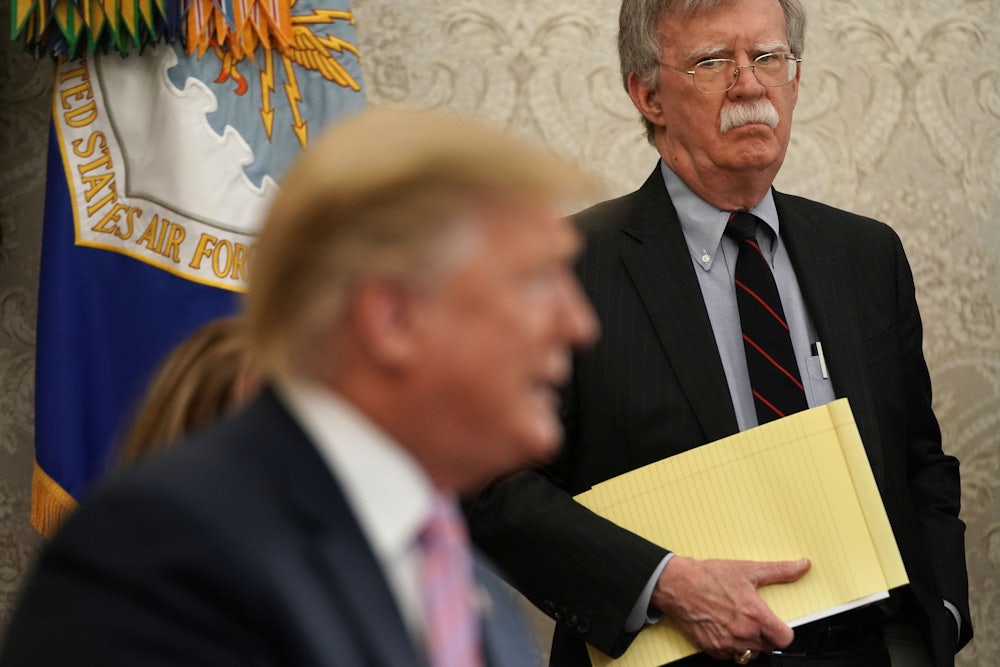Thursday night, The New York Times reported, we narrowly avoided a first step toward what could become a regional war in the Middle East. President Trump’s go-ahead—reportedly quickly revoked—for airstrikes targeting radar stations and missile facilities would almost certainly have resulted in Iranian deaths. This would not have been a replay of the targeted attack on Syria, a broken state in the middle of a civil war, in 2017. At that time, fearing an engagement with Russia, a military power, the Pentagon gave notice that the strike was coming. This strike, by contrast, against a regional power like Iran, would have seen a reprisal—most likely with Iranian proxies (Hezbollah or militia in Iraq) attacking American targets in the region, which would doubtless be seen as requiring a response in kind. There would have been no way of avoiding a regional conflict that experts say would make the Iraq War look small and simple.
Make no mistake: This is John Bolton’s war. It’s a war that the current national security advisor has been advocating since 2007. He has spoken of bombing Iran on television, in print, as a government official, and as a private citizen. He has received payment from an Iranian dissident group, the People’s Mujahedin of Iran (MeK), listing a $40,000 speaking fee for “European Iranian Events” in July 2017 on a government financial disclosure form (experts say the total number over a series of years could be significantly higher). He spoke at MeK’s conference in July 2017, promising regime change in Tehran. This war has been, in theory, on the table ever since President Trump took to the podium to announce the unilateral withdrawal of the United States from the Joint Comprehensive Plan of Action (JCPOA), and a strategy of “maximum pressure” through sanctions that are starting to crush the Iranian economy. But it did not become likely until John Bolton was appointed to the position of national security advisor.
John Bolton’s history as a hawk is well known, but the public is less aware of his manipulation of the national security state into achieving the outcomes he wants. Bolton is reported to have manipulated intelligence when he was in the George W. Bush administration on the issue of Cuban bioweapons. He was part of the team that built the intelligence case for war with Iraq, arguing that Saddam Hussein had weapons of mass destruction. The Guardian has reported he even went so far, in 2002, as to force a Brazilian diplomat who had gotten Saddam Hussein to sign on to the Chemical Weapons Convention to leave his post, threatening his children (Bolton denied making the threat).
Now, Bolton has turned his eye toward war with Iran: The current escalatory steps sped up on May 5, when Bolton announced, based on unseen intelligence making such a step necessary, that a strike group was being sent to the region. He and Secretary of State Mike Pompeo seem to have been given unprecedented control over military preparations, despite falling nowhere in the official chain of command.
What is unclear is why Trump has kept Bolton around if he truly doesn’t want war with Iran—as it would seem, both from the false starts Thursday, and from the pains he has taken to distance himself from Bolton on various occasions, particularly in early May. He has had multiple opportunities to fire John Bolton, none bigger than when he blew up what President Trump thought would continue to be his diplomatic opening with North Korea. Bolton nearly derailed the Singapore summit by calling on North Korea to pursue a “Libya” model of disarmament, which the Kim regime associates with Muammar Gaddafi being overthrown and killed after he gave up his nuclear weapons. Bolton killed the Hanoi summit by ensuring President Trump communicated this directly to Kim Jong Un on a piece of paper. A year before, Bolton had written an op-ed in the Wall Street Journal arguing that President Trump should bomb and invade North Korea rather than give negotiation a chance.
President Trump is not going to get what he got from the Kim regime with the Iranians: He won’t get a diplomatic summit while the sanctions remain in place. Kim Jong Un is similar to President Trump in that he wanted the prestige of meeting an American president and recognition of North Korea’s power—furthermore, he and his family had offered summits to multiple American presidents in the past.
By contrast, what the Iranians want is for sanctions to be lifted. There is a common viewpoint among Iranians that they are in an economic war already. The regime is looking to European countries, to China, and to Russia to actually bypass American sanctions and continue on with the economic promises these countries made when they entered into the JCPOA. If Europe doesn’t step up, Iran has threatened, they will go back to the path toward a nuclear bomb—the only weapon that can seemingly save a country from being a target for “regime change.”
An Iranian return to weapons-level enrichment would obviously cross red lines for both governments in the region (Israel, Saudi Arabia, the United Arab Emirates) and politicians on Capitol Hill, giving Bolton even more rope with which to tie Trump’s hands.
There is one way out, before the cries of hawks from Liz Cheney to Tom Cotton flood the Fox airwaves, and the media is fully saturated with military experts demanding missile strikes. The president who kicked off his reelection campaign in Florida talking about bringing troops home from the Middle East can put his personnel list where his mouth is: Fire John Bolton. This president used to fire people all the time on national television. If he wants to avoid the most devastating war since Vietnam, he should do it again.
